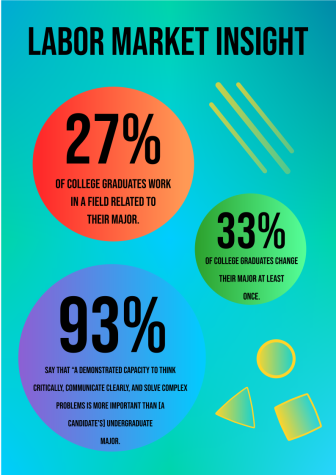 Every year, millions of students sign up for and take at least one AP test. Many take more than one.
Every year, millions of students sign up for and take at least one AP test. Many take more than one.
High schoolers have the mentality that to get a good job, they have to go to a good college. To get into a good college, students pile on intense classes to maximize their GPAs and engage in time-consuming extracurricular activities. They might take jobs proving their ‘dedication’ to a specific field, or start a related club to demonstrate their leadership skills; the formula is the same for everyone.
But what if “the “formula” to get into college is not the same as what is required for success in the real world?
Josh Thomas, a National Merit Semifinalist offered his opinion: “If they [students] are spending time on something they’re actually passionate about, I think that’s good . . . , but if they’re, say, volunteering somewhere because it looks good, . . . they’re wasting their own time,” he said. Thomas points out that if someone is participating in an activity that lines up with what they enjoy, it can be helpful for their career. However, there is little to gain from participation gin something solely for the college application.
By looking at what employers desire in their applicants, it is clear that it is not the specific majors and prestigious schools that so many high-schoolers are obsessed with. In 2018, Lightcast, a labor market analytics business, wrote a report titled the Robot-Ready report. In it, Lightcast said, “Nearly all employers surveyed (93 percent) say that a demonstrated capacity to think critically, communicate clearly, and solve complex problems is more important than [a candidate’s] undergraduate major.”
Additionally, according to an article from New Saint Andrews College, “33% of college graduates change their major at least once”, and “only 27% of college graduates work in a field related to their major.” It seems that the transfer from college to career is misjudged – people usually don’t use the degree they worked on for four years. In light of this, taking a broader approach to learning could more useful for long-term success, allowing people to have knowledge that applies to a wide number of fields; not just one specific major.
Matt Stutenberg, an industrial technology teacher at PV high school, went from working as a CAD designer, to training to become a teacher, to working at an auto-shop, to getting hired at Pleasant Valley for the job he holds now: “I went to Scott [Community College], and I got a job. I was going to be a CAD designer . . . I ended up going to UNI . . . after that I decided after that I didn’t want to teach. Then, . . . I got a job at an auto shop, and did that for two and a half years.” Finally, a friend told him about an opening at PV in the industrial technology department.
It is not uncommon for people to change jobs, or even career paths, during their lifetime. Like Stutenberg, many people go to school for something they don’t end up using in their work. This leads some to believe that it is wiser to get a broader education and studying more fields with less specification instead of training for a specific job. This is evidenced by the fact that “over a third of Fortune 500 CEOs have liberal arts degrees.”
Some are worried that people who are training very specifically will struggle later in such a rapidly-changing world. Tim Askew, the CEO of Corporate Rain International shares this view: “It is supremely ironic that at the exact time time we are required to absorb and synthesize a veritable fire-hose torrent of change and new knowledge, we are societally shying away from the very skills that make such conditions manageable,” he voiced. Askew means that, in a world that is changing quickly and replacing humans’ specified jobs, it is counterintuitive to get a job for a specific thing. Rather, it is advantageous to be well-versed in many things in order to be immune to the disappearance of jobs that humans can do cheaper than machines.
As the college and career landscape continues to change, the result of current strategies of education will be tested










Jessica Raymond • Nov 1, 2022 at 12:04 pm
I do think and agree that most students do classes and things just to look good for college. I feel as if most students are doing or taking that classes they enjoy instead trying to take the classes that can show how dedicated they are to their work and can get them into a good college. Everything we students seem to do for high school everything leads to college and how it will look for us.
Elyanna Toulou • Oct 28, 2022 at 9:47 pm
I think it is definitely true that students do so many things these days for the sole purpose of getting into a college. The idea of getting into a good college has been hammered into students from a young age and can limit their ability to take a different path.